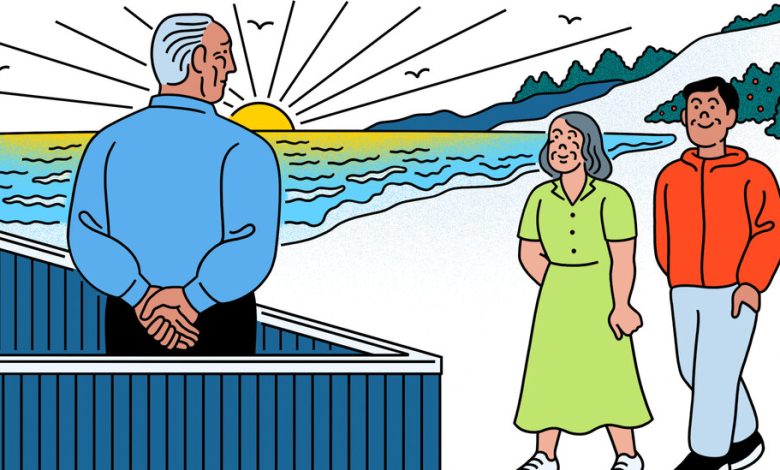I’m Dying of Cancer. Do I Have to Tell Anyone?

I am 76 and have lived a full and interesting life. My doctor recently gave me the news that the cancer I was treated for last year has returned and metastasized. I have started a course of immunotherapy treatments that, hopefully, should keep the cancer at bay for roughly the next two years.
I have not told my wife, my son or any of my friends about this. I don’t want to have to endure two years of pity. I would rather enjoy life with everyone as I have always done — and then break the news only when the time comes.
A very small percentage of people with the cancer I have are able to survive past the average two-year period with the treatments, but I would be a fool to count on that. I can also imagine everyone hoping against hope and then being devastated when a miracle doesn’t happen. Am I wrong to keep this from the people I love? — Name Withheld
From the Ethicist:
The decision of whether to disclose your situation is, of course, up to you. But living with a secret can be isolating, and sharing your news with your wife and your son, at least, could help relieve that burden. And your loved ones would want to feel that they did what they could to support you during this time; they may be saddened, later, to learn that you faced your diagnosis alone. You should also bear in mind that treatments can have side effects and that health declines are seldom linear; your condition could reveal itself much earlier than you had planned, leaving the people in your life confused and hurt that you left them unprepared. By depriving your loved ones of the facts, you deprive them of the chance to face the future together with you. Because your diagnosis affects their lives as well, I hope you’ll let them come to terms with this important truth.
If you fear a procession of pitying looks and aggressive sympathy (“No, really, how are you?”), let your loved ones know that this isn’t what you want — that you’re reconciled to what is happening and that you hope to go on living life as usual for as long as you can, sharing it with them. In his memoir, Martin Amis, who died this year, wrote about births and deaths as “ordinary miracles and ordinary disasters.” (In the ordinary miracle, two people enter a room and three come out; in the ordinary disaster, one person enters a room and none come out.) Give your nearest and dearest time to process your bad news, and I would guess that the situation, however disastrous, might become in that way ordinary to them, too.
Readers Respond
The previous column’s question was from a reader who was considering proposing to his girlfriend. She preferred a natural-diamond engagement ring, and he had ethical and cost concerns regarding that type of stone. He wrote: “I’m leaning heavily toward a lab-grown diamond. But I know that my girlfriend is only interested in a large natural diamond and would be extremely angry if given a lab diamond. I’ve considered telling her it’s a natural diamond, as the only way of being exposed is by a jeweler with an expensive loupe — or when she gets the ring appraised for insurance, which is, admittedly, a large risk. What should I do?”
In his response, the Ethicist noted: “The giver of a ring should be concerned, foremost, with what the ring means to the recipient. You’re free to tell your girlfriend that you’re unwilling to buy a natural diamond. But the deception you’re contemplating would be deeply disrespectful of her and her desires — and a wildly inauspicious step toward marriage. That ring is a promise, and you would be establishing that you can’t be trusted to keep one.” (Reread the full question and answer here.)
⬥
I understand the concerns about environmental and ethical issues, but has the letter writer considered a vintage piece? For example, I shop at thrift stores to avoid contributing to the fast-fashion industry. When you buy pre-owned goods, you’re not participating in a harmful market in the same way, and the ring (like my own engagement ring) would be all the more unique as well. — Elizabeth
⬥
This answer from the Ethicist stands out from so many others in that it is completely unambiguous, and absolutely on point. Sorry, ring buyer, but by the very fact that you raise this question you have revealed to all of us that your girlfriend is considering a long-term commitment to someone who shouldn’t be trusted. — David
⬥
Good response by the Ethicist. I would add that the bride-to-be may have her own issues. Demanding to be given a natural gem versus a cultivated one suggests that for her it’s more about stones than the connection between two people who care about each other. — Laurie
⬥
I agree that going into a marriage with deception is not a good idea, but the writer also appears to have a social conscience, and wants to make what contribution he can to reducing cheap labor and atrocious working conditions. What if we all purchased goods using the criteria that our purchase by itself has negligible effect on other people and the environment? — Steve
⬥
Yes, there are many individuals who wish to have engagement rings with diamonds in them, but one should not forget that the idea of a diamond as an engagement ring was developed by the diamond industry as a way to sell more diamonds. “A Diamond Is Forever” was one of the most successful ad campaigns ever. It essentially created a market for diamonds when none had previously existed.— Angela
